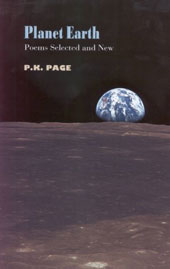The Porcupine's Quill
Celebrating forty years on the Main Street
of Erin Village, Wellington County
BOOKS IN PRINT
Planet Earth by P. K. Page
‘P. K. Page shares with her 17th-century predecessors, such as John Donne, a refusal to separate head and heart. What you hear in her work is the sound of intelligence brought crisply into focus.’
The title of this book is taken from Page’s poem, ‘Planet Earth’, which was chosen by the United Nations in 2000 for their celebratory program Year of Dialogue among Civilizations. Now poet and essayist Eric Ormsby, with Page’s input, has selected the best of Page’s poems originally collected in the two volumes of The Hidden Room (Porcupine’s Quill, 1997). Page has also contributed to Planet Earth a small number of very recent poems. Ormsby has written a wonderful introduction to this new selection; he hastens to point out that deciding what to include was a most difficult process because there was so much to choose from. He goes on to say:
‘It has become customary in Canada to describe P. K. Page as ‘‘distinguished’’, but that epithet betrays her. P. K. Page is simply too vivacious, too cunning, too elusive, to be monumentalized. She is in fact the supreme escape artist of our literature. Try to confine her in a villanelle and she scampers off into free verse. Peg her as a prose poet and she springs forth with a glosa. Categorize her as a poet who writes fiction but then note that you find very little ‘‘poet’s prose’’ in her stories. Her characters are often incised with acid and a cruelly keen burin. She is the shrewdest of observers but at the same time she celebrates life, low and high, in all its manifestations. One of the finest and most distinctive Canadian poets, P. K. Page is no provincial. She is a citizen not merely of the world, but of the earth.’

2003—Griffin Prize for Poetry (Canada),
Shortlisted

2003—Globe Top 100,
Commended

2008—New England Book Festival,
Commended
Table of contents
Foreword
Planet Earth
One
Deaf Mute in the Pear Tree
The Flower Bed
The Mole
The Understatement
Portrait
For G.E.R.
Images of Angels
Arras
Black Bamboo
A Grain of Sand
Melanie’s Nite-Book
Two
Evening Dance of the Grey Flies
The Crow
The Hidden Room
Personal Landscape
About Death
Custodian
Finches Feeding
Traveller’s Palm
Fly: On Webs
After Reading ‘Albino Pheasants’ by Patrick Lane
Chimney Fire
Poor Bird
Cosmologies
Three
The Filled Pen
George Johnston Reading
The Gold Sun
Hologram
Dwelling Place
Poem Canzonic with love to A M K
In Memoriam
Address at Simon Fraser
Four
Outcasts
Schizophrenic
Man with One Small Hand
Another Space
Seraphim
The Disguises
Inebriate
Knitters
Bank Strike
The Permanent Tourists
The Inarticulate
Young Girls
Landlady
Element
The Sick
Squatters
Only Child
Paranoid
Typists
Elegy
Cullen
Five
Alphabetical
Six
The Apple
The Figures
Autumn
Unable to Hate or Love
The Castle
Love’s Pavilion
Cry Ararat!
Visitants
Out Here: Flowering
Funeral Mass
The Hidden Components
The Glass Air
The Metal and the Flower
Emergence
Stories of Snow
Old Man
The Bands and the Beautiful Children 165
Leather Jacket
Lily on the Patio
Picking Daffodils
The Gift
Cook’s Mountains
Seven
Conchita Knows Who Who Is
Portrait of Marina
Star-Gazer
Brazilian Fazenda
After Rain
Cross
Giovanni and the Indians
On Educating the Natives
Exile
Domestic Poem for a Summer Afternoon
Presences
The Answer
Intraocular Lens Model 103G
Invisible Presences Fill the Air
War Lord in the Early Evening
The Selves
Journey
Index of Titles
Acknowledgements
About the Author
Review text
‘Few poets in the last 60 years have demonstrated as much subtlety of thought and honesty of feeling as P.K. Page. Page emerged during Canadian poetry’s fabled golden age (arguably 1945-1965), and today still remains one of the world’s most affecting poets.
‘Planet Earth brings together works from her long career, and, as such, does an excellent job of underlining Page’s contribution to Canadian literature. Whether she is depicting life’s elaborate carnival with broad stokes of language, or precisely dissecting folly with a bladed pen, Page always cuts directly to the heart of the human condition.
‘She remains a frustratingly square peg for categorists, however. Her work is too protean, or simply too good, to be dismissed or embraced for just one of its many concerns, styles or forms. In Planet Earth, Page shows that she can rival T. S. Eliot as a satirist with poems like ‘‘The Permanent Tourists’’:
Look, you can see them nude in any cafe
reading their histories from the bill of fare,
creating futures from a foreign tea cup.
Philosophies like ferns bloom from the fable
that travel is broadening at the café table.
‘Or create an evocative portrait as she does in ‘‘Schizophrenic’’:
Malleable she wore her lustre nails
daily like a debutante and smoked,
watching the fur her breath made as they joked,
caught like a wind in the freedom of their sails.
‘Page’s primary concern in recent years, however, is revealed by the title of the collection. Planet Earth is meant to be an encompassing label, hugging to itself all that is earth-bound and human, while also drawing specific attention to Page’s concern for the environment (an address Page gave at Simon Fraser University is included in the collection for this purpose). Whatever her focus, however, Page’s remarkable work holds the reader’s attention by its sheer, understated force.’
—Noel Rieder, Books in Canada
Review text
‘P.K. Page is at once our most revered and our least understood poet. She stands alongside A.M. Klein as one of the finest writers of the group of Montreal-based modernists that emerged in the forties and fifties, but she has yet to be critically assimilated, largely because her works are so diverse -- and because she has never lapsed into a single signature style: she does prose poetry, formal poetry, free verse, social poems, psychological poems, and transcendental visionary poems, infusing anything she writes with an unmistakably precise sense of language. Her poems were collected in 1997 in the two volumes of The Hidden Room. Planet Earth is a much slimmer book, a selection from her career that offers a few typically exquisite new poems, the gem of which is the witty, discursive A-Z autobiographical, which takes readers from ‘‘afterwards’’ to ‘‘zero’’ by way of computers, love, New Guinea, Alberta, and algebra:
Arithmetic bored me --
I thought it a tool for housewives --
but in my teens
the tidy
algebraic knot
the perfect puzzle
the code of x plus y
the beautiful clean
equilibrium of equations
fired me.
I was a sudden mathematician.
This love was purer
than my passion for pig Latin
and those difficult linguistic
‘pigs’ that followed.
Should I, instead, have been
a cipher clerk?
‘Eric Ormsby is an attentive and sympathetic reader of Page’s work, and it’s hard to imagine a better editor for this selection. This is very much a poet’s choice of Page’s verse; academic trappings, chronology, and original sequence are ignored in favour of letting the poems be poems. As a result, Planet Earth is a readable, varied, and convincing testament to Page’s powers as a poet.’
—Jack Illingworth, amazon.ca
Review quote
‘Elegant, rigorous, fresh, P.K. Page’s work sings with a voice of independent character and maenad conjecture. It is a creature that lives on its own terms and terrain. It is startling, authoritative, and anti-sentimental, able to bear cool as well as passionate gazing at our own species. Her poems are always thinking -- each line is thinking, while its six senses remain impeccably alert. Her poems live by wit, wisdom, sass, suspense and a muscular lissome synapse and diction. They are daring in scope, meticulous in accomplishment, and boldly moral -- with a lovely flavour of amoral verve! We fall under the charm of her reasoning, of her fecund, fastidious imagination, of her many musics, and of her necessariness to us, her essentialness.’
—Griffin Prize Judges’ Citation
Review quote
‘One thing is certain: no better volume of poems appeared in Canada in 2002.’
—W J Keith, Canadian Book Review Annual
Review quote
‘Planet Earth is essential reading for anyone professing a serious interest in Canadian poetry.’
—Tim Chamberlain, Victoria Times-Colonist
Review quote
‘P. K. Page (to paraphrase her remarks on George Johnston) asks difficult, serious questions neither she nor we can answer. She celebrates the world of our comings and goings. She reminds us that we are human and that we can love one another and she rarely forgets or lets us forget that ‘‘No man may him hyde / From Deth holow-eyed.’’ ’
—Richard Outram, The Citizens Weekly
Previous review quote
‘[T]here is something terrifying about this book [The Hidden Room], the judgment it casts on our feckless literary age: both in how it recuperates the technical artistry that has been abandoned in this country and in how it refurbishes poetry’s bygone ambition of fitting together, as palpable and as precisely as possible, experience and language.’
—Carmine Starnino, Montreal Gazette
P. K. Page wrote some of the best poems published in Canada over the last seven decades. In addition to winning the Governor General’s Award for poetry in 1957, she was appointed a Companion of the Order of Canada in 1999. She was the author of more than two dozen books, including ten volumes of poetry, a novel, short stories, eight books for children, and two memoirs based on her extended stays in Brazil and Mexico with her husband Arthur Irwin, who served in those countries as the Canadian Ambassador. In addition to writing, Page painted, under the name P. K. Irwin. She mounted one-woman shows in Mexico and Canada. Her work was also exhibited in various group shows, and is represented in the permanent collections of the National Gallery of Canada, the Art Gallery of Ontario, and the Victoria Art Gallery, among others.
A two-volume edition of Page’s collected poems, The Hidden Room (Porcupine’s Quill), was published in 1997, and the full range of her richly varied work is being made available in a digital resource, The Digital Page, supplemented by a series of texts in print and e-book format published by The Porcupine’s Quill.
P. K. Page was born in England and brought up on the Canadian prairies. She died on the 14th of January, 2010.
The Porcupine's Quill would like to acknowledge the support of the Ontario Arts Council and the Canada Council for the Arts for our publishing program. The financial support of the Government of Canada through the Canada Book Fund (CBF) is also gratefully acknowledged.





